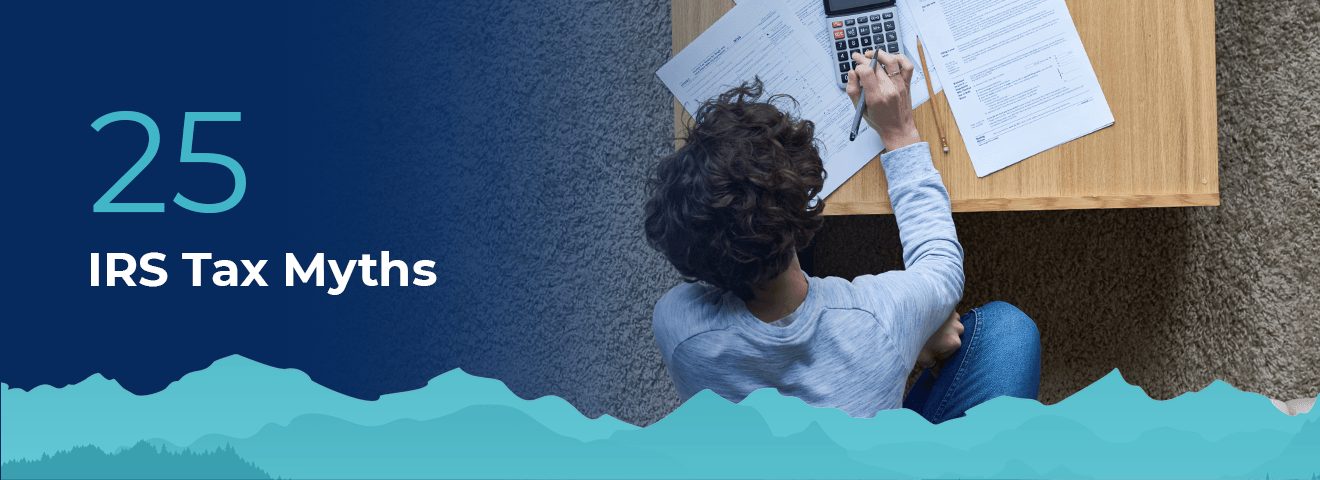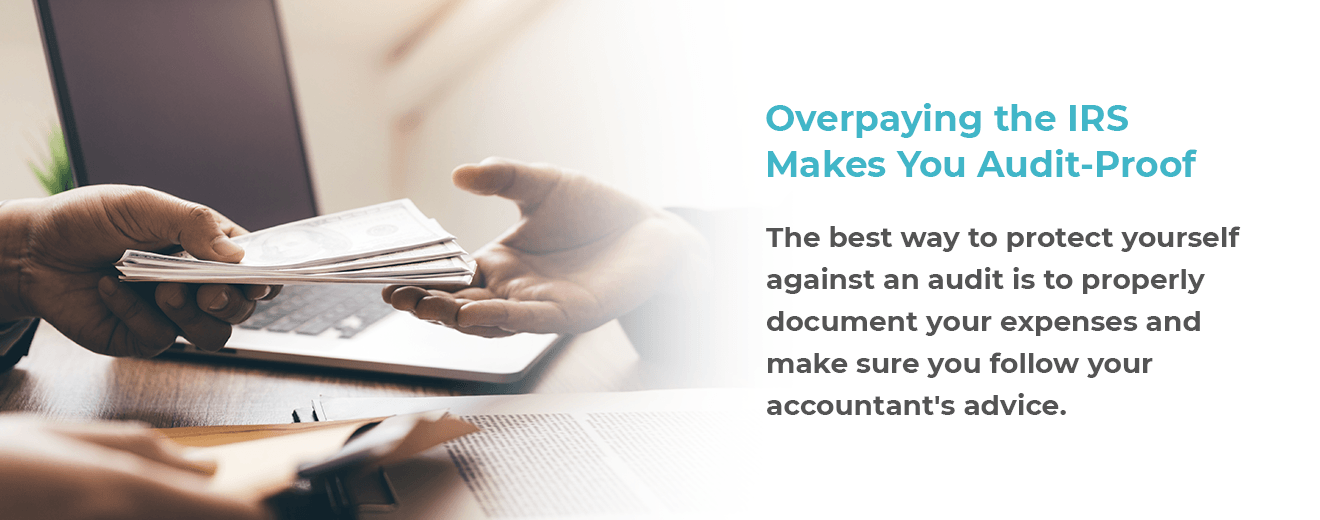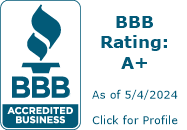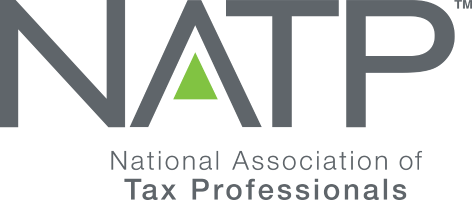25 IRS Tax Myths
With tax laws changing every year and contradictory tax advice all over the internet, it can be hard to know which information is fact or fiction. And when it comes to your taxes, it’s important to follow the IRS’s rules to avoid fees and penalties. We’ve compiled a list of some of the most common tax myths and misconceptions so you can spend less time worrying and more time preparing.
Learn the truth behind these IRS tax myths, along with some advice for how to navigate unique tax situations.
Table of Contents
- Tax Filing
- Student Taxes
- Claiming Dependents
- IRS Penalties And Punishments
- Errors And IRS Audits
- Taxable Income
- Deductions
- IRS Communication
- Business Taxes
- Choose BC Tax For Tax Relief Services
Tax Filing
Of the many myths about filing your taxes, these are the top three:
1. If You Filed Your Taxes a Month Ago and Are Still Waiting for Your Refund, You Should Try Filing Again.
While there is no penalty or fine associated with submitting your tax return multiple times, the IRS discards every subsequent tax return with the same ID number. Sending a second tax return can even delay your refund. However, if you want to submit another return because you noticed an error and need to change something, you should file an amended return instead.
2. If You File a Tax Extension, You Can Wait Until the Extension Date to Pay Your Taxes.
Even though your tax extension pushes back the final date for filing your taxes, the IRS still expects you to pay your estimated tax liability at the time of filing your extension. If there are any discrepancies between your estimated tax liability and what your final return indicates, you will have to pay the difference when you submit the extended return, or you will receive a refund. Penalties and interest for late taxes begin at the tax due date regardless of your filing date, so make sure to pay the estimated taxes when you file an extension.
3. If I Fail to File a Tax Return, the IRS Will Do It for Me.
While this is technically true, it’s also the least desirable scenario for your taxes. When a taxpayer fails to file a tax return, the IRS will file a Substitute for Return (SFR) for them based on information that employers and other sources have submitted. The SFR never includes any additional exemptions that you may otherwise be qualified for, and the IRS still expects you to pay any penalties that may have accrued since the due date. If you are required to file taxes, you should never wait for the IRS to do it for you.
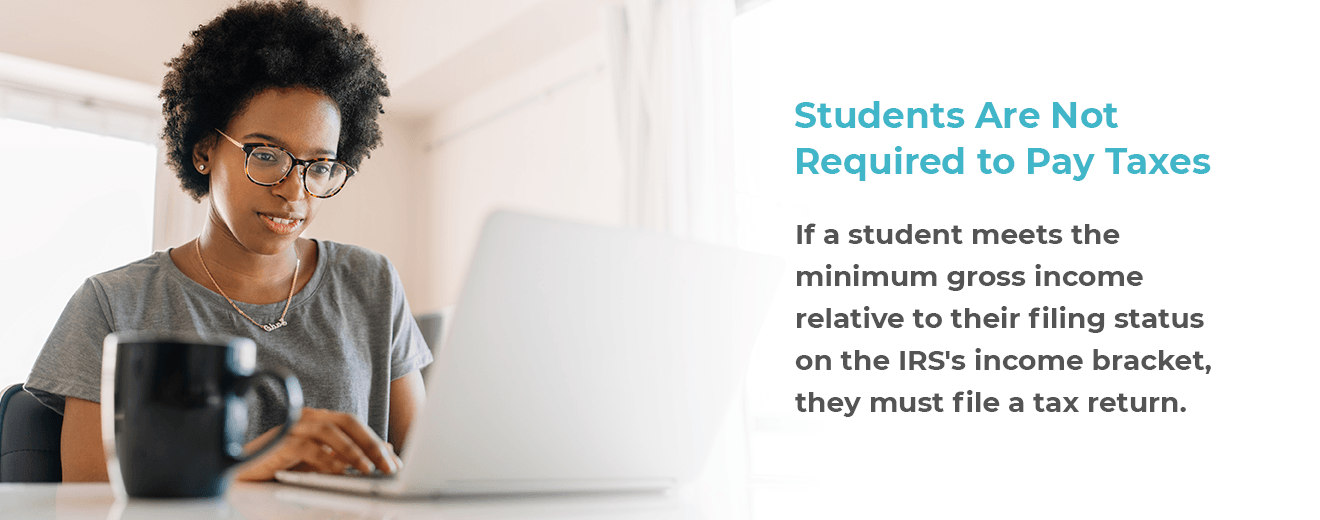
Student Taxes
Here are the most common myths about filing taxes if you’re a student:
4. Students Are Not Required to Pay Taxes.
If a student meets the minimum gross income relative to their filing status on the IRS’s income bracket, they must file a tax return. But even if you make less than the minimum gross income, it’s usually recommended that you submit a tax return anyway. After all, you could use your tax refund to pay for pricey textbooks!
5. Students Do Not Need to File a Tax Return If Their Parents Claim Them as Dependents on Their Return.
If you work, you will likely still need to file a return if you meet the IRS’s minimum requirements for federal tax returns.
6. You Do Not Have to Pay Taxes If You Owe Student Debt.
Even if you owe student debt, the IRS still expects that you pay taxes if you meet the minimum requirements. Thankfully, you can deduct up to $2,500 of interest paid per year on student loans as long as another person cannot claim you as dependent on their tax return.
Claiming Dependents
Who you can claim as a dependent can be confusing. Here are the top misconceptions about claiming dependents:
7. Parents Cannot Claim College Students on Their Federal Return.
As long as the student is studying full-time at a qualifying school, you can claim a college student on your tax return. To qualify, the student must reside with you for over half the tax year, and you must provide at least half of their total financial support for the year.
8. You and Your Spouse Can Claim Your Children on Both of Your Tax Returns.
Every individual child can only be claimed by a single taxpayer, whether you and your spouse are filing jointly or separately. For divorced and separated parents, the claim goes to the parent who has custody of the child for most of the year. The custodial parent may also opt to provide Form 8332 or a written declaration to allow the noncustodial parent to claim the child as a dependent.
9. If Your Spouse Is Unemployed, You Can Claim Them as a Dependent.
You and your spouse will either file as Married Filing Jointly or Married Filing Separately for tax purposes. In both cases, spouses cannot be claimed as dependents.

10. You Can Claim Your Pets as Dependents.
Although you might see your pet as part of the family, the IRS only classifies dependents as either qualifying children or qualifying relatives. However, if you have a service animal, you can include the costs of buying, training and maintaining the animal in your medical expenses for the year. These costs generally include food, grooming and veterinary care.
IRS Penalties and Punishments
These are the most common myths about penalties and punishments:
11. You Will Go to Prison for Owing Taxes.
If you fail to pay your taxes because of a lack of money, the IRS cannot send you to jail. But if your lack of payment comes from a failure to file your taxes or attempted tax fraud, that’s a different story. Failing to file can lead to hefty fines and prison sentences of up to five years.
12. The IRS Will Take Your House If You Are Unable to Pay Your Taxes.
The IRS will not immediately seize your property if you are late in paying your taxes. However, the IRS can place a tax lien on your property that they will lift if you set up a long-term payment plan. Just make sure not to default on the payment plan to avoid further complications.
Errors and IRS Audits
Many people are afraid of making errors on their tax returns or getting audited. Here are the top misconceptions about errors and audits to help you feel more prepared:
13. Your Gross Income Is Too Small to Get Audited, or You Are More Likely to Get Audited If You Claim a Home Office.
Although the chance of being audited increases based on your income, tax returns that report very little income still have a chance of being audited. Even if you report zero income for a tax year, you should always be prepared to back up the claims on your tax return.
14. If You File for an Extension, the IRS Is More Likely to Audit Your Return.
The IRS considers a wide variety of variables for audit selection, and thankfully extensions are not part of their selection process. The biggest factors of audit selection are related examinations — when a tax return involves transactions with other taxpayers who are also being audited — and random chance.
15. The Person Preparing Your Taxes Is Liable for Any Mistakes in Your Tax Return.
Even if your accountant is the one who makes an error in your tax return, you are still responsible for any income tax owed. However, the preparer may be held reliable for additional penalties and interest that you may accrue from these errors. And if the preparer is committing tax fraud, they could face fines or jail time if you report them to the IRS.
16. Overpaying the IRS Makes You Audit-Proof.
Unfortunately, there is no evidence to support this claim. The best way to protect yourself against an audit is to properly document your expenses and make sure you follow your accountant’s advice.
Taxable Income
Here are the most common myths regarding taxable income:
17. If You Don’t Receive a 1099 or W-2, You Do Not Have to File a Return or Pay Taxes.
Even if the employer fails to send your wage summary form, the employee is still responsible for reaching out to the employer to secure one. If the employer still does not provide you with one, you will have to fill out Form 4852 to substitute the information. You can fill out most of the form with information from your pay stubs, which is why you should keep them.
18. You Do Not Have to Pay Taxes If You Are Paid in Cash or Cryptocurrency.
The IRS expects you to report all income received, no matter the form. It may be especially tempting to hide cryptocurrency from your tax return since it’s an “invisible” currency with no paper trail. But in recent years, the IRS has sent letters to virtual currency owners warning them of back taxes owed. The more popular cryptocurrency becomes, the better the IRS will become at tracking its movement.
19. You Should Avoid Making Too Much Money Because You Will Be Taxed More.
This misconception is based on a misunderstanding of marginal taxes rates. Marginal taxes apply on a threshold basis, and filers only pay the given tax rate for the range of income the percentage applies to.
For example, a single filer for the tax year 2021 has a marginal tax rate of 12% for income over $9,950, and the rate for income over $40,525 is 22%. If the taxpayer makes $45,000, they will be taxed 12% on income up to $40,525 and 22% on everything above. In other words, there is no threshold where the taxpayer loses money from taxes.
Deductions
Deductions can be complicated. Knowing these myths can help you understand deductions better.
20. If You Work From Home for Your Company, You Can Always Claim a Home Office Deduction.
Whether you can claim a home office deduction depends on why you are working at home. If you work from home because your company does not provide you with office space at their location or because you regularly need to work outside of normal business hours, you can take the deduction without issue. However, if you work from home out of convenience or get more work done while out of the office, you cannot claim a home office.
If you are self-employed, you can claim a home office as long as you use the office area exclusively for your business and conduct most of your business operations there.
21. You Can Deduct Any Reimbursed Job Expenses.
IRS Communication
Understanding how the IRS will communicate with you can help you avoid falling for scams.
22. The IRS Will Call for You to Pay Taxes Over the Phone.
Be wary of calls from those who claim to be representatives of the IRS, especially if they call about tax payments. The IRS will never call requesting immediate payment with a specific payment method. If the caller asks that you pay with a prepaid debit card, gift card or wire transfer, then they are certainly a scammer posing as an IRS representative.
In general, the IRS will try mailing a bill to collect a tax debt before calling. If that fails, they may attempt to follow up with a call. If they do, the representative will not demand that you make an immediate payment over the phone, nor will they direct you to pay anywhere but the U.S. Treasury.
23. Formal IRS Actions Are Final and Irreversible.
Challenging an IRS appeal might sound scary, but as a taxpayer, you have the right to dispute any IRS appeal that you believe is incorrect or misinformed. You are entitled to challenge most IRS decisions and have the right to a written letter of the IRS’s decision. You even have the option of bringing the IRS to court.
Business Taxes
If you’re doing business taxes as well as personal taxes, you’ll want to know these myths:
24. You Can Pay All of Your Self-Employed Taxes at the End of the Year.
Unlike regular employees, self-employed individuals must pay quarterly estimated taxes throughout the year, similar to larger businesses. Paying estimated taxes quarterly can be especially confusing to those just starting as an independent contractor. Self-employed individuals use form 1040-ES to calculate and file their quarterly taxes. The tax due dates are:
- April 15th
- June 15th
- September 15th
- January 18th
25. If You Create an LLC, You Can Write Off Personal Expenses as Business Expenses.
Regardless of your business type, the IRS has specific guidelines for determining which expenses can be written off as business expenses. The expenses have to be ordinary and necessary, meaning they are common in your industry and helpful and appropriate for your trade. For example, if you run an online apparel store, a gym membership would not be considered ordinary or necessary for your business and cannot be written off as a business expense in your tax return.
Choose BC Tax for Tax Relief Services
Even if you are aware of all of the tax myths out there, preparing your taxes can be stressful. At BC Tax, we are dedicated to helping our clients reduce their tax debt and stress. Our Enrolled Tax Agents are experienced, credentialed professionals who are uniquely qualified to prepare your individual and business taxes. Whether you need help with tax planning and preparation, tax appeals, back taxes or audits, you can rest assured that your tax return is in good hands. Contact us today and let us know how we can help you!

 1-800-548-4639
1-800-548-4639